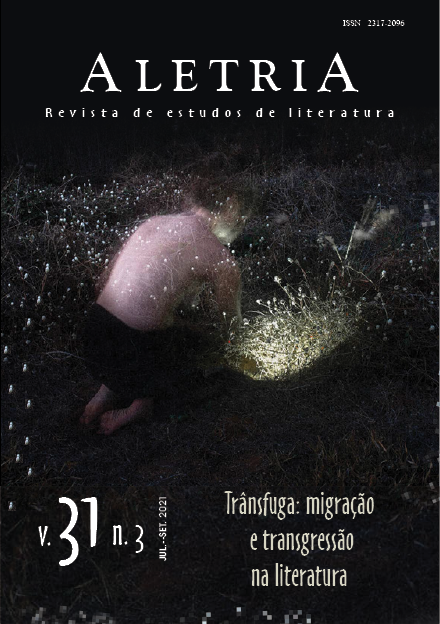Violence and Escapism as Leisure for the Underprivileged in Irvine Welsh’s Trainspotting and Glue
DOI:
https://doi.org/10.35699/2317-2096.2021.26766Keywords:
Scotland, Irvine Welsh, working class, leisure, violence, escapismAbstract
This article analyses representations of the experience of leisure by young characters who belong to the working classes of Scotland, in Irvine Welsh’s Trainspotting and Glue, considering the historical context upon which the narratives are based, i.e. Thatcher’s era. Such experience – based on a reality of a shrinking welfare state, lack of opportunities and mass unemployment – is informed by two factors: escapism, evidenced by heroin use; and violence, evidenced by alcohol abuse and football hooliganism. I intend to discuss how the politics of Thatcher’s rule, as well as the neoliberal thought and agenda she followed, are represented as a key factor in shaping the experience of leisure of the youth of underprivileged classes in Scotland in the selected novels.
Downloads
References
BELL, Tim. Choose life. Choose Leith. Edinburgh: Luath, 2018. E-book.
BODIN, Dominique et al. Sport and Violence in Europe. Strasbourg: Council of Europe Publishing, 2005.
CLARKE, Peter. Hope and Glory: Britain 1900-2000. London: Penguin Books, 2004.
COOKE, Anthony. A History of Drinking: The Scottish Pub since 1700. Edinburgh: Edinburgh University Press, 2015.
HARVEY, David. A Brief History of Neoliberalism. New York: Oxford University Press, 2007. E-book.
KENNEDY, Tristan. How Irvine Welsh Went from Enfant Terrible to the Scottish Tourist Board's Favourite Guy. In: Vice News. 18 dez. 2019. Disponível em: https://www.vice.com/en_uk/article/g5xpp7/irvine-welsh-profile-scotland-trainspotting. Acesso em: 30 abr. 2020.
LEISHMAN, David. A Parliament of Novels: the Politics of Scottish Fiction 1979-1999. In: Revue Française de Civilisation Britannique, v.14, n.1, p. 123-36, 2006.
MORACE, Robert. Welsh’s Trainspotting. New York: Continuum, 2001.
MORACE, Robert. Irvine Welsh (New British Fiction). New York: Palgrave MacMillan, 2007.
ROSS, Stephen. Youth Culture and the Post-War British Novel: From Teddy Boys to Trainspotting. London: Bloomsbury, 2018. E-book.
SKINNER, John. Contemporary Scottish Novelists and the Stepmother Tongue. In: HOENSELAARS, Ton et al. (Org.). English Literature and Other Languages. Amsterdam: Rodopi, 1999. p. 211-220.
STEBBINS, Robert A. Leisure. In: Encyclopaedia Britannica. Disponível em: https://www.britannica.com/topic/leisure. Acesso em: 07 jul. 2020.
THATCHER, Margaret. Margaret Thatcher: a life in quotes. In: The Guardian, London, 8 Abr. 2013. Disponível em: theguardian.com/politics/2013/apr/08/margaret-thatcher-quotes. Acesso em: 21 maio 2020.
VERNON, James. Modern Britain: 1750 to the Present. Cambridge: Cambridge University Press, 2017.
WELSH, Irvine. Trainspotting. Tradução de Galera & Pellizzari. 1.ed. Rio de Janeiro: Rocco Digital, 2014. E-book.
WELSH, Irvine. Cola. Tradução de Paulo Reis. 1.ed. Rio de Janeiro: Rocco, 2019.
WELSH, Irvine. Foreword. In: BLANCE, Andy. Hibs Boy: The Life and Violent Times of Scotland’s Most Notorious Football Hooligan. Glasgow: Fort Publishing Ltd., 2010. E-book.
WELSH, Irvine. Scotland’s Murderous Heart. In: The Guardian, London, 20 Out. 2005. Disponível em: https://www.theguardian.com/society/2005/oct/20/penal.crime. Acesso em: 12 Out. 2018.
Downloads
Published
How to Cite
Issue
Section
License
Copyright (c) 2021 Amaury Garcia dos Santos Neto (Autor)

This work is licensed under a Creative Commons Attribution 4.0 International License.
Authors who publish with this journal agree to the following terms:Authors retain copyright and grant the journal right of first publication with the work simultaneously licensed under a Creative Commons Attribution Non-Commercial No Derivatives License that allows others to share the work with an acknowledgement of the work's authorship and initial publication in this journal.Authors are able to enter into separate, additional contractual arrangements for the non-exclusive distribution of the journal's published version of the work (e.g., post it to an institutional repository or publish it in a book), with an acknowledgement of its initial publication in this journal.Authors are permitted and encouraged to post their work online (e.g., in institutional repositories or on their website) prior to and during the submission process, as it can lead to productive exchanges, as well as earlier and greater citation of published work (See The Effect of Open Access).





